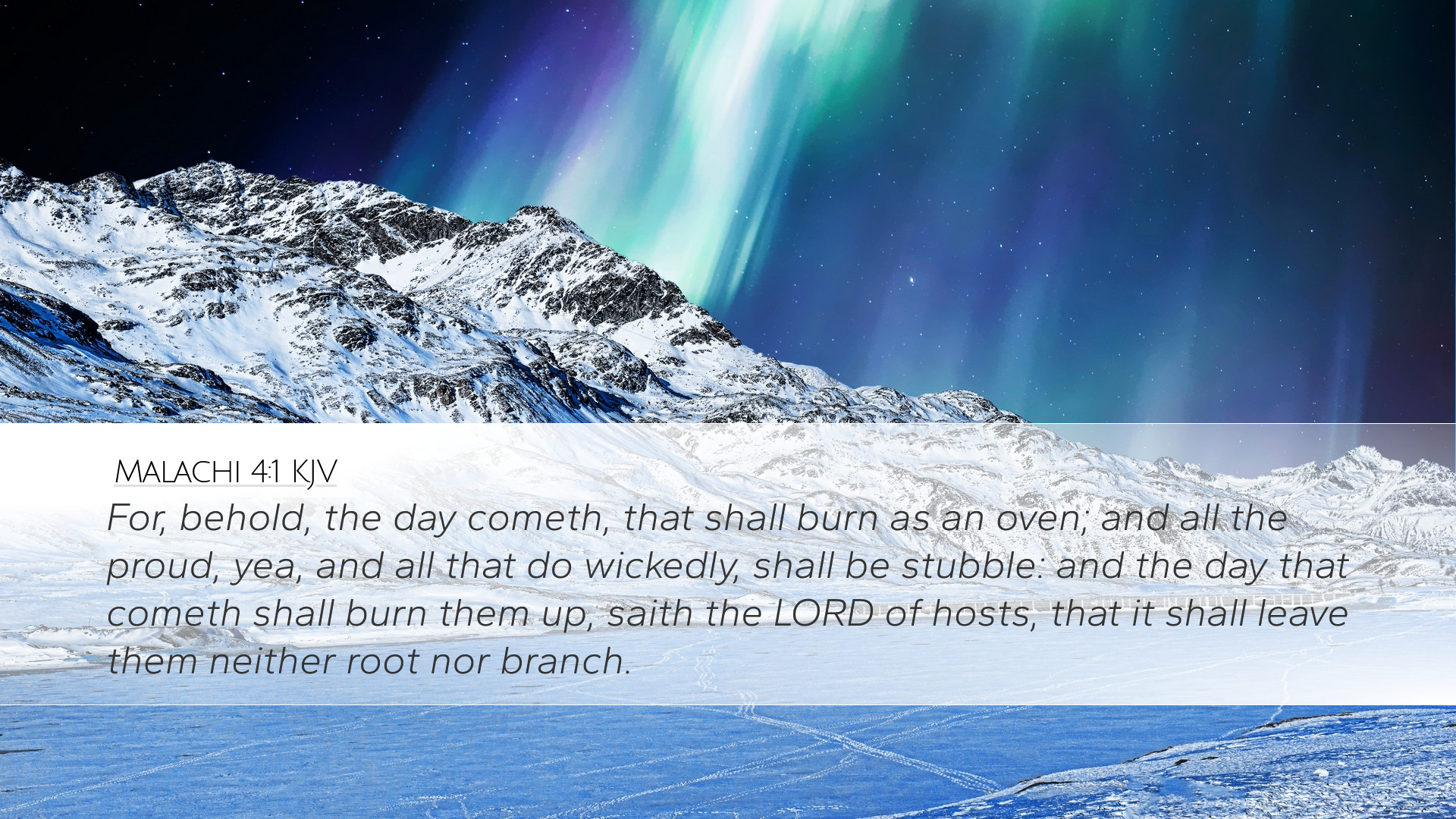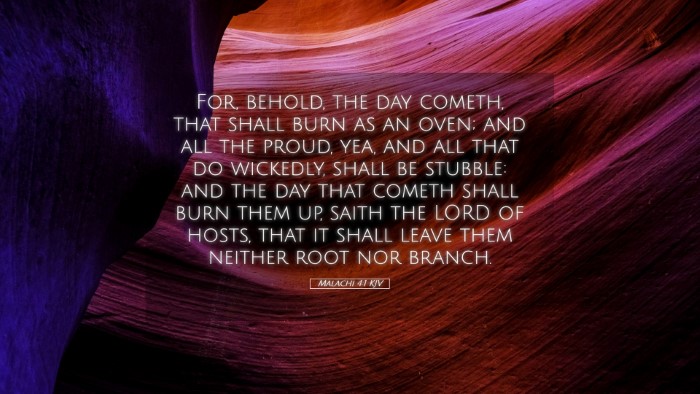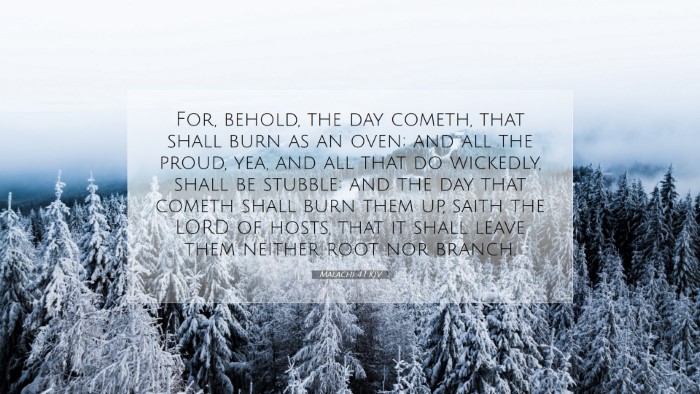Old Testament
Genesis Exodus Leviticus Numbers Deuteronomy Joshua Judges Ruth 1 Samuel 2 Samuel 1 Kings 2 Kings 1 Chronicles 2 Chronicles Ezra Nehemiah Esther Job Psalms Proverbs Ecclesiastes Song of Solomon Isaiah Jeremiah Lamentations Ezekiel Daniel Hosea Joel Amos Obadiah Jonah Micah Nahum Habakkuk Zephaniah Haggai Zechariah MalachiMalachi 4:1
Malachi 4:1 KJV
For, behold, the day cometh, that shall burn as an oven; and all the proud, yea, and all that do wickedly, shall be stubble: and the day that cometh shall burn them up, saith the LORD of hosts, that it shall leave them neither root nor branch.
Malachi 4:1 Bible Commentary
Commentary on Malachi 4:1
Verse: Malachi 4:1 - "For behold, the day is coming, burning like an oven, and all the arrogant and evildoers will be stubble; the day that comes shall burn them up, says the Lord of hosts, so that it will leave them neither root nor branch."
Introduction
This verse is part of the final chapter of the Book of Malachi, the last book of the Old Testament. The prophet Malachi speaks of a future day of judgment that will bring both destruction and hope. This commentary synthesizes insights from various public domain sources, providing a holistic view of this profound text.
Contextual Background
Malachi prophesied during a time when the Israelites had returned from exile and were facing spiritual apathy and moral corruption. This prophetic word addresses the conditions of his day while also reaching forward to eschatological themes of judgment and restoration.
Commentary Insights
-
Matthew Henry:
Henry emphasizes the certainty and intensity of the coming day of the Lord. He describes it as "burning like an oven," symbolizing the rigorous judgment that will ensue for the wicked. The imagery of fire serves to illustrate both purification and destruction. Henry asserts that this day is imminent and should serve as a warning to the arrogant and evildoers that their downfall is certain.
-
Albert Barnes:
Barnes expounds on the metaphor of the oven, suggesting that it indicates an all-consuming fire—one that leaves no remnant. The reference to the "arrogant and evildoers" signifies those who oppose God's law and ways. Barnes highlights that this prophecy serves a dual purpose: it reflects God's justice towards sinners and provides reassurance to the righteous that their plight will not be ignored forever.
-
Adam Clarke:
Clarke offers a meticulous historical and linguistic analysis of the verse. He notes that the "day that comes" refers explicitly to the final reckoning where divine justice will be unmistakably executed against those who defy God's commandments. Clarke underlines that God’s promise to eliminate “root nor branch” signifies a comprehensive and irrevocable judgment that ensures no part of the wicked will remain.
Theological Implications
This passage from Malachi carries significant theological weight, particularly in its exploration of divine judgment and human accountability. The stark contrast between the fate of the wicked and that of the righteous establishes a clear moral order ordained by God.
Judgment and Justice
The "day" spoken of indicates a specific time determined by God, emphasizing sovereign control over history. This has implications for understanding God’s justice, which is integral to his character. The destruction of the wicked serves to highlight God's holiness and righteousness.
Hope for the Righteous
While the imagery is dire, it also contains a promise of restoration and renewal that follows judgment. The faithful are reminded that suffering does not go unnoticed, reassuring them that their endurance in righteousness will be vindicated.
Practical Applications
For pastors, students, theologians, and Bible scholars, this verse serves as a profound reminder of the reality of judgment and the importance of living in a way that aligns with God’s will.
-
Awareness of Judgment:
The certainty of judgment encourages believers to live with intentionality and urgency, aligning their lives with Godly principles.
-
Encouragement for the Righteous:
The assurance that God will address injustice offers hope and consolation to those who struggle against oppression and evil.
-
Call to Repentance:
This verse serves as a sobering call to self-examination and repentance, urging individuals to turn from arrogance and evil ways.
Conclusion
Malachi 4:1 provides a powerful testament to the certainty of God’s judgment and the ultimate triumph of righteousness. By examining insights from historic commentaries, believers today can grasp the significance of this prophetic message, prompting reflection on their own spiritual journeys and the moral state of society. As the end of the Old Testament canon, Malachi leaves readers with both a warning and a beacon of hope as they look forward to the coming of the Messiah.


